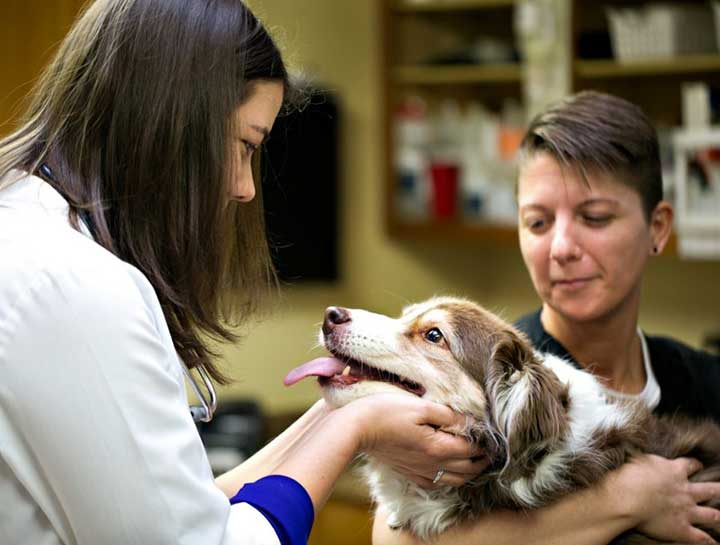Common Canine Emergency Visits
Routine emergencies to look out for in dogs.
At Aspen Grove in Fort Collins, Colorado, we often treat the same dog emergencies. As an emergency vet, we understand how stressful these situations can be for you as a dog owner. To alleviate some of that stress, we hope to provide you with a little bit more about common emergencies and what to expect from your visit.
Here is some background information on some of the most common issues we see as an emergency vet and general advice that will be helpful given your situation.
Anaphylaxis or anaphylactic shock
This is a severe allergic reaction characterized by sudden collapse and severe breathing difficulties. The first clinical signs are often swelling around the face or muzzle, the appearance of wheals or hives on the skin, vomiting or diarrhea, and restlessness. These clinical signs can quickly progress to collapse and breathing difficulty. Left untreated, severe anaphylactic shock can end in death. There are many causes for anaphylaxis that vary from insect stings, contact allergies to injection reactions. You should seek emergency vet care immediately if you think your pet may be experiencing anaphylaxis.
Automobile injury
Although you should make sure your dog has a clear airway, do not put your hand in the mouth of a conscious dog. Cover open wounds with whatever clean material are available. Move your dog with care, supporting its body as much as possible, and using a blanket or other makeshift stretcher if at all possible. Immediately bring your dog to our emergency vet.
Bites and fight wounds
These are particularly serious and require immediate veterinary intervention if:
- A lot of blood has been lost or if bleeding is persistent and direct pressure fails to stop it.
- Wounds involve the head, especially the eyes, ears, nose or throat.
- There are penetrating Injuries in the region of the chest, abdomen, or groin.
Bleeding
It can sometimes be difficult for pet owners to know when bleeding requires an emergency vet and when it can be treated at home. As a general rule of thumb, blood pumping out in spurts or dripping so fast that it makes a pool on the floor or soaks through a bandage within a few minutes is cause for alarm. Ears, feet, toenails, the tongue and the nose can bleed severely and may need veterinary attention to stop the loss of blood as quickly as possible. Whenever possible, you should attempt to control bleeding by covering the wound with a clean absorbent compress and applying direct pressure. However, consult your veterinarian for specific first aid instructions on controlling bleeding on the way to the vet.
Bloating, Gastric Dilatation and Volvulus
A dog that is experiencing an episode of “bloat” or gastric dilatation will develop a bulge behind the rib cage from a distended stomach full of gas. In some cases, the distended stomach will twist upon itself, causing a “volvulus”, which will obstruct the entrance and exit of the stomach. Swelling of the abdomen becomes very pronounced, and the dog will rapidly collapse due to shock. In its early stages, the dog may show repeated, unsuccessful attempts to vomit. This is an emergency vet situation that requires immediate veterinary attention if the dog is to survive.
Breathing difficulty
If your pet is having difficulty breathing, especially if your dog is “open mouth breathing”, you need to get to the veterinarian without delay. BE VERY CAREFUL — dogs that are having difficulty breathing are prone to panic and even the gentlest dog may bite! Never put your fingers in the mouth of a choking dog.
Burns and scalds
Burns can be caused by heat such as a fire, or by caustic substances such as acids or alkalis (lye). Unless you witness these injuries, they may initially go unnoticed until a scab or an area of skin or hair loss is discovered. This is because the initial wounds are usually hidden by the dog’s fur. If you see your pet get burned or scalded, cool the burned area by running water over the burn or covering it with cold wet towels. Rinse with cool water for 15 minutes to remove or dilute the caustic material and soothe the pain if a caustic substance caused the burn. If skin loss is noticed, protect the area with a clean covering. In all cases, contact your vet immediately.
Convulsions or seizures
A seizure is a series of violent, uncontrolled spasms. Most seizures last for less than two minutes. If a seizure lasts more than five minutes or if several seizures occur in rapid succession, your dog requires immediate veterinary treatment to prevent permanent damage.
During the seizure, DO NOT put your hand in its mouth. The dog WILL NOT swallow its tongue. Protect the dog from injuring itself, but otherwise do not attempt to interrupt the seizure. Once your dog has recovered from the seizure, keep it warm and provide reassurance by talking calmly or patting him. Your dog will require veterinary attention to determine the cause of the seizures, but as long as the seizure wasn’t prolonged, you can book the appointment at your earliest convenience.
Diarrhea or vomiting that is persistent
Repeated or continuous vomiting or diarrhea, with or without blood, could be a sign of poisoning, an intestinal obstruction, or acute gastrointestinal infection. Dehydration is a major concern, especially in small dogs. Contact your veterinarian if you observe blood in the stool, if the vomiting or diarrhea persists beyond six to twelve hours or if your pet becomes less responsive or weak. Abdominal distension and repeated, unproductive attempts at vomiting are often an early indication of Gastric Dilatation and Volvulus. If you notice your dog repeatedly trying to vomit, DO NOT WAIT – get to the emergency vet immediately.
Eclampsia
Eclampsia is also known as hypocalcemia, milk fever, or puerperal tetany. It is a condition that affects nursing mothers, especially if her litter is large. It is caused by depletion of calcium in the bloodstream from heavy milk production. In some cases, it may also occur during the later stages of pregnancy. Signs are vague and include restlessness, panting, increased salivation and stiffness when moving. This can rapidly progress to muscle twitching and spasms, convulsions, pyrexia (high fever) and sudden death. Contact your veterinarian if you are concerned that your dog is developing eclampsia.
Eye injury
Many eye injuries can cause blindness or a ruptured eye if left untreated. If the cornea is scratched or punctured, it will be very painful. To prevent further damage, do not allow your dog to rub its head on the carpet or scratch the eye. If a blow to the head causes the eyeball to come out of its socket, keep it moist with saline solution (e.g. contact lens solution) and protect it from direct injury. Sudden blindness or vision loss (your dog may start stumbling or bumping into things, or you might notice widely dilated pupils) may be a symptom of glaucoma. If your cat develops symptoms such as runny eyes, colored discharge from the eyes, squinting, sudden dilation of the pupils, or apparent blindness, get immediate veterinary treatment. DO NOT DELAY.
Heatstroke
This can happen at any time in hot, humid weather. It is frequently the result of leaving dogs in cars with too little ventilation. The signs are excessive panting, lethargy and distress. Unconsciousness and death can quickly follow. If heat stroke occurs, cool your dog as quickly as possible by immersing it in a tub of cool water if it is small enough, by hosing it down with a garden hose if it is larger, or by applying cold wet towels to its body and legs. Avoid using ice or ice water because this may drop the temperature too quickly and cause additional complications. Animals that have been exposed to heat or smoke from a fire should be offered water as soon as they are stable. Take the dog to a veterinary hospital immediately (keep the car windows open during the trip) to ensure that there are no other problems.
Hemorrhagic gastroenteritis
This condition is characterized by severe bloody diarrhea and vomiting, along with weakness or collapse. This condition is serious and requires immediate veterinary attention.
Heart failure
Also called “heart attack”, cardiac failure, and cardiac insufficiency, heart failure may go undiagnosed until the dog suddenly collapses or faints. As dogs age, they may develop a condition called congestive heart failure (CHF). This may affect either the left, the right or both sides of the heart. Signs of impending heart failure include coughing (especially at night), difficulty breathing, bluish discoloration of the tongue (and other mucous membranes), decreased stamina and exercise intolerance. Exercise or excitement often immediately precedes the collapse. With the increased demand from the excitement, the inefficient heart is unable to pump blood fast enough. This causes a severe lack of oxygen to the muscles and brain, which results in sudden collapse.
If you observe any of these signs, contact an emergency vet immediately.
Injuries
Some injuries are medical emergencies, depending on the type and extent of wounds. If you suspect that your dog has a broken bone, immobilize the area and use a board or other support during transportation to the veterinarian. Any penetrating wound to the chest or abdomen and virtually any injury involving the eye should be regarded as a medical emergency. Injuries to the head or those causing difficulty breathing should also be treated as immediate emergencies.
Poisoning
Poisoning of any sort is an emergency. If you see your dog ingest a suspicious substance, call your veterinarian. Many different things in the house and garden are potentially toxic to dogs, including pesticides, chemicals, cleaners, and medications. Most poisonings occur without your knowledge. Clinical signs are variable and include excessive salivation, vomiting, diarrhea, seizures or collapse, skin damage due to caustic substances, etc. If a product label is available, check it for first aid instructions, such as whether to induce vomiting. You can usually induce vomiting with one teaspoon of hydrogen peroxide orally or a teaspoon of salt in the back of the mouth. Keep a sample of the vomit for testing. Seek veterinary care as soon as possible to help reduce the absorption of toxins. Bring a sample of the suspected toxin with you, as well as any packaging.
Unconsciousness or collapse
This may occur with or without seizure activity. It often occurs without warnings, such as sudden heart failure or a blow to the head. Collapse should always be treated as a medical emergency.
There are a number of common household products that can be toxic to dogs. For a comprehensive list, visit the Pet Poison Helpline.
This client information is based on material written by: Ernest Ward, DVM © Copyright 2009 Lifelearn Inc. Used and/or modified with permission under license.

